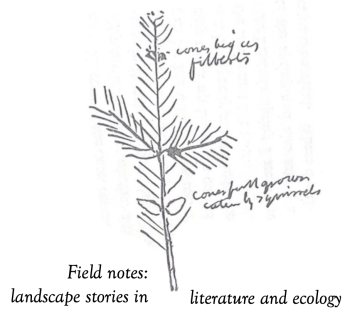UMF incorporates RLEs into the first-year experience by including high-impact activities (e.g., Fusion Week or other intensive experiential activities) into First Year Seminar.
UMF provides sophomores with an “Advanced RLE” delivered through discipline-specific courses. Advanced RLEs engage students with external partners relevant to professional practice and career exploration (especially those that might lead to internships, clinicals, or other non-curricular student experiences).
Fall 2023 RLE Courses
First Year RLEs: First Year Fusion
FYS 100 Section 9: The Good Life
Credits: 3
Linda Beck
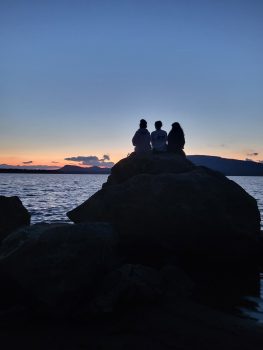
In The Good Life course, you are invited to set aside time as you begin your undergraduate career at UMF to think about what may be the most important questions in life: What counts as a Good Life? How do I go about living that Good Life? What will be my great work for the good of all? During Fusion week, you will begin the course at a tranquil retreat on Flagstaff Lake run by Maine Huts and Trails. You will stay in cabins along the lake where you can calm your mind, and focus on what really matters. We’ll read inspiring texts that explore The Good Life and have meaningful conversations while spending time in nature, walking the trails, and canoeing the river. Throughout the semester, students will explore their values and visions of The Good Life, articulating it in a final project through a medium of their choosing.
- Spend time at a tranquil retreat on Flagstaff Lake
- Enjoy nature while you contemplate what the Good Life means to you
- Engage in meaningful conversations and develop important connections with classmates as you transition to the UMF community
FYS 100 Section 5: Urban Maine: Stories and Sounds
Credits: 3
Lewis Robinson
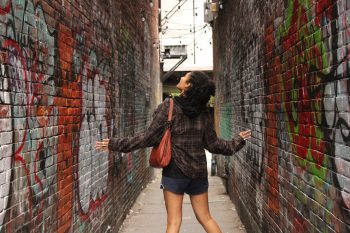
Maine is more than a pastoral vacationland. Cities like Portland, Augusta, and Belfast that continue to evolve and add new layers to their unique histories. During Fusion Week 2022, Urban Maine: The Stories and Sounds, students traveled to Portland where they explored one of Maine’s premier coastal cities and met with a wide variety of Maine city dwellers: from fishermen to artists, shopkeepers to chefs. During the fall semester, through their collaborative collection of individual narratives and soundscapes, they created their own work in the form of audio podcasts, sound collages and videos. Next year we plan to return to Portland to continue our exploration of this vibrant, ever-changing city and its diverse sites, sounds, and people.
- Explore the Coastal Maine cities of Portland and Belfast
- Investigate how the dynamics of sounds shape place and experience
- Learn how to record and produce audio
- Craft powerful stories from the soundscapes you collect
- Collaborate with your classmates as you explore Maine and join the UMF community
Yolanda Ares (’26): “I lived in a city, so for me that wasn’t much of a big difference. But the people we met and interviewed to capture their stories, that is what I truly took away from the experience… When you learn something new, as that stranger becomes a friend in that moment, them telling you their story really impacts you.”
FYS 100 Section 10: Japan Through Space and Time
Credits: 3
Sarah Maline
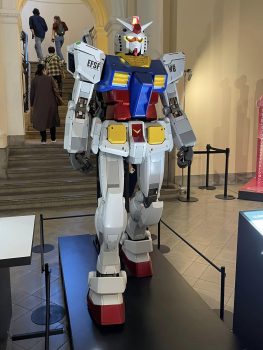
Almost 400 years ago, the great poet-monk-traveler Matsuo Bashô wrote that “every day is a journey, and the journey itself is home.” Through the Japan Global Fusion course, your UMF journey will begin with a pre-semester trip to Japan where you explore many of the unique places and spaces Bashô encountered in his journeys. We first visit Tokyo, the global city of light, movement and futuristic fantasy where we immerse ourselves in Japanese culture, history and food. We then travel to the far north of Japan’s Honshu island to explore Akita with Japanese university students and faculty from UMF’s sister school, Akita International University. We will arrive in time to experience the Kantô Matsuri harvest festival, visit an active local farm, and meet the legendary local Namahage demons who try to scare the laziness out of children and adults alike. We then travel to the ancient Japanese capital of Kyôto, exploring its narrow streets and temple paths to discover the places of old that still exist within this modern city. We will then take Japan’s famous bullet train back to Tokyo where we catch our flight back home and then regroup in the fall to continue our discussion with our Akita counterparts through a Virtual Global Experience (VGE).
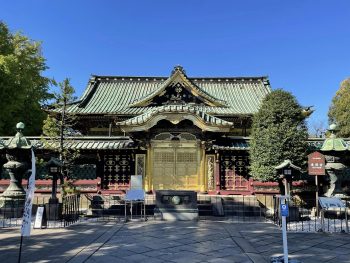
During the trip, we will build our own individual tabi nikki, or travel diaries, drawing inspiration from historical artworks, the diaries of historical Japanese travelers and our own experiences through writing, photography, video and sound recording, and even drawing or painting—whatever processes you want to use to document your time in Japan. When we return to UMF, we will work together to create a group diary project to synthesize our experiences and share them with the campus and local community. Through a project-based VGE with our friends and colleagues from Akita, we will analyze how our expectations and memories of the places we visited activate and/or alter our understanding of those places, and how places build and hold meaning through space and time.
First Year RLEs: First Year Seminars
FYS 100 Section 3: Life, Work, Success, and Meaning
Credits: 3
Scott Erb
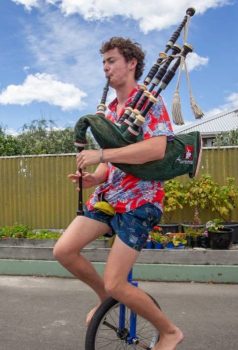
You are beginning your college career during a time of global transformation on multiple levels: the technology/information revolution, climate change, globalization, and changes in the work world, Your career paths will be very different than those of past generations.
This course is designed to give you tools and abilities to use your college experience to navigate a path to a career and life that fits your own values and goals. In this course you will be responsible for undertaking a project personal to you, reflecting on your values and interests in order to research various life/career paths. Your goal is not to figure out where you’ll end up, but how you’ll explore the options and possibilities, using the tools available at UMF (classroom, student support, and connections with alumni and the community). This includes practical activities (developing a resume, researching career possibilities), personal reflection (developing your own statement of value, focused on what you find meaningful), and an overall project of developing a strategy to use your college experience to prepare for a future that fits your values and interests. Class will include discussions about how the world is changing (culture, the economy and technology), what it means to reflect on ones’ own values, and how to handle obstacles certain to come your way. The goal is not to figure out exactly where you’re going, but to have you take responsibility for your education, using it to explore, learn and prepare for a meaningful life in a changing world.
First Year RLEs: Honors First Year Seminars
HON 101 Section 3: Making Things with Words
Credits: 3
Steve Grandchamp
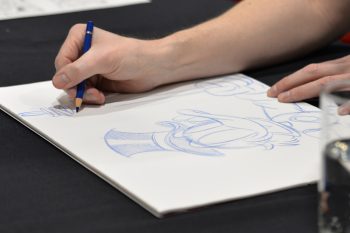
What does it mean to publish a written work? In “Making Things with Words,” students will explore small-scale and creative acts of publishing, such as: Emily Dickinson’s letter poems and handmade booklets; the zines that flourished in the 1970s and 1980s; and popular contemporary graphic memoirs. In this way, this course will introduce students to the principles and practices of creative visual and literary publication. Working with words and images created by themselves and others, students will accordingly craft a final creative project in the genre of their choice (handmade booklet, zine, or graphic memoir). Class readings and discussions will cover the history of the book, the impact of changing technology on the reading experience, and the relationship between form and content across media. To expand students’ understanding of the relationship between image and meaning, the class will visit the Portland Museum of Art for a guided tour and discussion of museum holdings and artistic methodology. They will also collaborate with a published graphic memoir artist in workshop sessions that develop their skills for visual communication. Along the way, students will talk with professionals working in the poetry, magazine, and comic industries in order to explore career pathways related to the course content and projects.
HON 101 Section 11: Field Notes: Landscape Stories in Literature and Biology
Rachel Hovel and Noelle Dubay
Credits: 3
Whether one is a scientist or a poet, “making sense” of the world calls upon a common set of practices: observation and inquiry, inference and connection. When we encounter the wondrous or new in our environments, we try to describe and explain–but sometimes the most discovery takes place at the limits of our definitions. What do we know, and how do we know it? This course will explore approaches from the natural sciences that have opened new insights and opportunities for learning, and will look for similar transformative moments in literature. We will use examples from the past to examine legacies of colonization and extraction, and look forward through visions of futuristic science fiction. Throughout, students will work individually and collaboratively on their own research processes, including keeping a field notebook that will be used to synthesize findings, working as a team to research human and/or natural dimensions of our local landscapes, and crafting multimedia presentations to share new insights. Students will also learn about multiple careers that use different types of “field notes”, through guest speakers or project partnerships with a field biologist, a popular science writer, and a creative writer who focuses on the natural world.
Advanced RLEs
ANT300: Food: On Purpose
Gaelyn Aguilar
Credits: 3
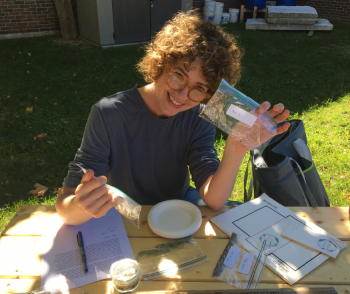
Preparing Students for their Ikigai: the Japanese concept that loosely translates as “that which makes life worth living”
This course explores how food became a deeply catalyzing force for living and working on purpose. We do this through giving attention to generativity and learning to co-generate [with other generations] in order to regenerate ourselves and the planet. In our purpose-driven exploration of food, we will discuss topics such as food insecurity, food memories, regenerative agriculture, food sovereignty, and other human and cultural connections to this centrally important element of our lives as people and groups of people. We will:
- Attend Common Ground Country Fair and conduct research and interviews with fair participants and vendors
- Visit Temple Tappers, an award-winning, family-run pursuit of tapping birch trees to produce Pure Birch Syrup, “one of the unique tasting delights on the planet”
- Create an end-of-the-semester dinner party inspired by Generations Over Dinner, “a decentralized program intended to engender meaningful conversations across generations by modeling and creating an experience that connects and values perspectives across the age continuum”
PSY284: Creativity and Professional Narrative
Joey Essoe
Credits: 3
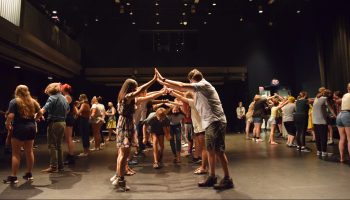
Preparing Students for Internships and Graduate Training in Psychology
Overview: In this student-centred, workshop-style course, students will explore the simple but profound questions of “What’s your story? What do you want to do as a psychologist? Why are you the perfect person to do just that?” To this end, students will discuss the topic of creativity, reflect deeply on their futures as psychologists, practice skills and routines that enable successful careers without neglecting self-care, and develop compelling and fundable narratives for their future work.
Assessments: As a class, students will develop a creativity-related research project; individually write a 5-page graduate fellowship grant proposal; and individually generate video presentations to pitch their narratives and their project.
Class activities will include:
1. Readings and discussions on creativity and professional development
2. Developing individual narratives as psychologists
3. Guest speakers in relevant career paths
4. Literature search and evaluation
5. Designing a research project and identifying suitable instruments (e.g., experimental task, questionnaires, etc)
6. Conducting individual “internet Easter egg hunts” to figure out what a funding agency is looking for in fellowship applicants (then write the application and pitch it in videos)
7. Participate in a university-funded, self-service weekend retreat to (a) reflect and discuss possible career paths, and develop next-steps to investigate and pursue these paths, and (b) practice self-care routines, life skills (e.g., making a balanced plan between work, relationships, and play)
MAT 177 Section 1: 3D Design and Printing
Dan Jackson
Credits: 3
Exploring careers in 3D Printing, CNC Machining, and Precision Design Fields
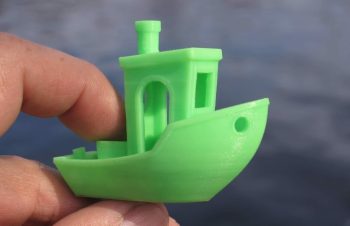
Why Take This Course?
With a focus on real-world uses and ongoing learning in the technical world of 3D design and printing, MAT 177 will provide you with the knowledge and tools you need for success in a wide range of creative and technical pursuits. We take students on an engaging adventure into the world of 3D design and printing. Here’s what you can expect:
Getting Started: Learn the basics using TinkerCAD, and then move on to more advanced skills in Fusion360. You’ll learn how to turn your ideas into digital 3D models and actual physical objects.
Hands-On Challenges: Participate in real design challenges, including a final project where you’ll create a product that solves a real-world problem.
Industry Insight: Enjoy guest appearances from industry experts who will present special challenges and offer unique insights into the field.
Research and Learning: Engage in weekly projects using professional 3D design software. You’ll have the chance to experiment, analyze your results, and think about what you’ve learned.
Showcasing Your Work: Create a reflective portfolio of your designs to highlight your growth and creativity throughout the course.
Collaboration and Community Engagement: Work with local CNC experts, present your design portfolio to the UMF community, and connect with community partners on your final project.
Mathematics in Design: Learn how to use mathematical principles to improve your designs, reduce waste, and make your designs more effective.
ANT 257: Criminality, Freedom, and Justice
Nicole Kellett
Credits: 3
Preparing Students to Work in Law Enforcement, Corrections, and Social Service Organizations
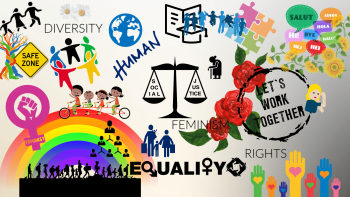
Centering racial and gender injustice as a root cause of massive incarceration, conflict and war, intergenerational trauma, and barriers to truth and reconciliation, this course explores the history of injustice and cultivates imagining opportunities for a free and just society. Throughout the course students engage with individuals working towards social justice including lawyers, commissioners, Maine State representatives, non-profit leaders, previously incarcerated individuals, among others. By engaging in informational interviews, public writing, in-class debates, and workshops with system impacted individuals, students gain hands-on experience with social justice issues that can be applied to a range of careers.
Spring 2023 RLE Courses
First Year RLEs: First Year Seminar
FYS 100 Section 3: Popular Horror Narratives
Credits: 4
Steve Grandchamp

In our contemporary culture, horror narratives are everywhere: in the movies we watch, the podcasts we listen to, the books we read, and the games we play. At first glance, this might be surprising: why do people enthusiastically seek out ways to be feel uncomfortable, uneasy, and scared? This class will search for answers to this question in a sustained manner by investigating horror narratives embedded within a wide variety of genres including novels, poems, television shows, short stories, films, video games, and podcasts. In addition to writing formal analytical essays about these primary texts, students will also actively develop their own creative horror narratives in the genre of their choosing as a final project in the course. RLE activities include screening one of horror director Caryn Waechter’s films via Zoom session during which my students can learn about how she became a horror director; an informal chat session with director Jayne Decker to discuss not only the play (which students will attend after they have read the original novel) but also what led her to the theatre; and a Zoom Q&A with horror video game developer Hallie Larsson about their career.
Advanced RLEs
ECO 228: Environmental and Natural Resource Economics
Credits: 4
Wendy Harper
Preparing Students for Tourism and Economic Analysis
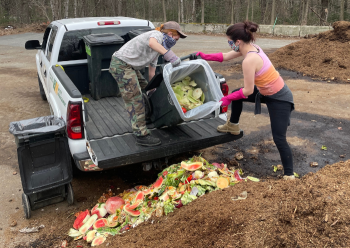
The interaction between environmental quality and the environment is important everywhere, but is of particular interest here in Maine. Many Maine businesses have used the Maine environment as part of their brand (Poland Springs and L.L. Bean as examples) and, as a significant driver of the state’s economy, the tourism industry relies heavily on Maine’s plentiful environmental amenities (mountains, lakes, beaches, etc) and recreational activities (snowmobiling, boating, hunting and leaf peeping). This course will examine the interaction between economics and environment by exploring the concepts of externalities, public goods and common property resources, along with cost/benefit analysis and environmental policy analysis. To deepen our understanding of these concepts, students will apply these concepts to a local issue through a semester-long research project. Professional and career exploration in tourism, hospitality, and economic analysis is provided via attendance at the Maine Governor’s Conference on Tourism.
PSY 284 Section 3: Belonging
Credits: 4
Rhonda Jamison
Preparing Students for Internships and Graduate Training in Psychology

Students in this advanced RLE will develop a whole-group research project investigating belonging on a college campus and present their findings to the campus community. This will include (1) investigating psychological literature related to the concept of belonging, (2) developing belonging-related research questions, (3) collecting data from UMF students, and (4) drawing conclusions about belonging on a college campus. Throughout the course, students will engage in research-supported activities inside and outside of class to build rapport and belonging within the group. Students will spend time investigating internships, graduate school opportunities and career paths in psychology. This career exploration portion of the class will culminate with visits from 2 UMF psychology Alumni (one who pursued graduate school and one who did not; both who are working in psychology-related fields).
PSY 397 Section 1: Social Psychology Lab
Credits: 4
Karol Maybury
Preparing Students for Research and Clinical Careers in Psychology

The UMF Social Psychology Research Lab is an opportunity for undergraduates to create and implement an original study of human behavior.
Students will collect and review relevant psychological literature; articulate a hypothesis or research question; and design a study examining how personality impacts evaluations of text messages and emojis. Text messages are an increasingly ubiquitous aspect of human communication, and researchers are just beginning to study how this mode differs from F2F and vocal (phone call) communication. This topic was chosen to demonstrate that we can best answer intriguing questions about human behavior if we are familiar with psychological measurements (e.g., how psychologists assess the Big 5 personality traits).
We will host two guest speakers who have published research studies in social science journals. They will explain their research as well as the path they traveled to attain their current positions as social scientists. By the end of the term, students will have experience 1) locating and evaluating relevant social scientific findings 2) writing a testable hypothesis 3) creating an experiment that validly tests a hypothesis 4) conducting an experiment (data collection while following ethical human subject protocols) 5) statistical analysis, conducting simple data analysis and inferential and descriptive statistics (t-tests, Pearson correlations) 7) mastering how to write a summary of a simple quantitative psychological study 8) evaluating how the study’s findings may inform existing research on emoticon use (encoding) and perception (decoding) as well as how these steps 1) answer scientifically important questions 2) are employed by working researchers in experimental psychology.
Fall 2022 RLEs
First Year RLEs: First Year Fusion
FYS 100 Sections 11 & 12: Conflict and Compassion
Credits: 4
Kelly Bentley & Nicole Kellett
Fusion Week: Micmac Pow Wow
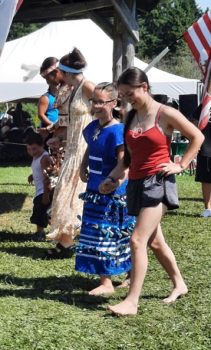
The world is increasingly becoming interconnected as people, products, ideas, values, norms, images, sounds, and myriad other aspects migrate across the globe. The intersection of these various flows can promote growth, knowledge, and connection, yet can also cause conflict and division. As a college student and global citizen, how can you understand someone who may identify in a different way than you regarding race or ethnicity, gender, sexual orientation, nationality, religion, ability, or other attributes that provide a sense of self? Do differences make us fear each other or bring us closer? Through this course, we will examine our own identities and how we can work together to compassionately engage with issues such as cancel culture, health and well-being, social justice movements, civil rights, diversity, among others.
The course will begin with an immersive field week at the Mawiomi Gathering of the Tribes in Caribou, ME, in which we will partake in feasting, dancing, drumming, and sweat lodges. We will then visit Liberation Farms, a Somali-Bantu-run community farm, the adaptive sports center in Carrabassett Valley, and visit with members of Maine Inside Out, an organization centered on justice-impacted youth. Building off of these immersive experiences, the remainder of the course will dive into issues of health, gender, and climate change while also conducting a series of professional development activities. The course will conclude with a group project creating a Public Service Announcement on a selected topic of interest.
- Enjoy camping with the Aroostook Band of Micmacs at the Mawiomi Gathering of Tribes
- Engage in traditional dancing, drumming, crafts, music, foods, and ceremonies to learn about the strength, spirit, and endurance of the Aroostook Band of Micmacs
- Learn about organizations, agencies and individuals dedicated to celebrating and promoting diversity in Maine
- Collaborate with a small cohort of students to engage with community resources and cultural life at UMF.
Trinity Slate (’26): “Through Conflict and Compassion, I was able to immerse myself in and learn about Mi’kmaq culture and beliefs through experiences outside a classroom. By attending the “Mawiomi” (Gathering of Tribes) and taking part in Mi’kmaq cultural activities as a class, we were able to all come together as one to discuss difficult but necessary topics related to diversity, equity and inclusion.”
FYS 100 Section 9: Freshwater in the Anthropocene
Credits: 4
Rachel Hovel
Fusion Week: Maine Huts & Trails
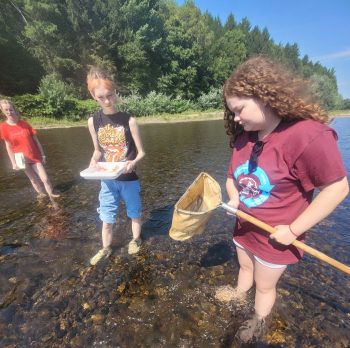
Lakes and rivers provide important habitat and cultural connection. Access to water defines political boundaries and decisions. Yet, freshwater ecosystems are changing rapidly in the current Anthropocene era where human activity is the dominant influence on the environment. In this course, we explore the importance of freshwater habitats and resources, identify human reliance and impact on these ecosystems, and examine connections to freshwaters within our local communities.
In Fall 2022, we embarked on a collaborative research project focused on a local dam removal and river restoration project, and worked with community partners from the Atlantic Salmon Federation and the Town of Farmington Parks and Recreation Department. This resulted in three outreach products that highlighted the process and outcomes of the dam removal: a short podcast, a newspaper article, and an informational poster. These products identified ecological and community implications of the dam removal, critically evaluated multiple perspectives regarding this restoration project, and raised awareness about our local watersheds.
- learn about lake ecosystems while spending two nights at the Maine Huts & Trails Flagstaff Hut
- identify and investigate a contemporary topic related to freshwater ecosystems in our region
- complete a hands-on project to improve awareness and connection to freshwater in our own community
Gavin Crowley (’26): “I formed a group of friends from Freshwater in the Anthropocene while getting a “digit detox” as we spent two nights at Flagstaff Lake. It was a good way to get into college as I felt more settled into college life when we got back.”
FYS 100 Section 16: Success and Failure
Credits: 4
Denisa Cundick
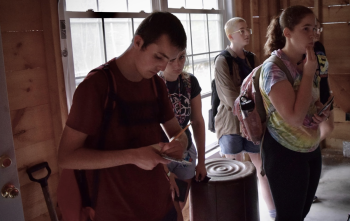
Fusion Week: Maine Huts & Trails
What does it mean to be successful? Why do some people see failures as steps on the path to success while others do not? In this course, we will explore different ways of thinking about success and what it can mean, as well as the role failing might play in success.
During Fusion week, we will explore around town and beyond, talking to successful people, learning more about how to stay active and healthy, as well as how to manage your money and time. Throughout the semester, we will talk with people about the paths they took to get where they are today, and what success looks like to them so that you may develop your own plan for success at UMF and beyond.
- Explore what it means to be successful in college and how to go about setting yourself up for a positive college experience.
- Learn about the resources UMF and the Farmington area have to offer to ensure your success in college and life.
- Figure out how to eat well at college and try at preparing your own food!
- Enjoy going on adventures on campus and off as you find your footing with a group of peers, making the whirlwind first days of the academic semester easier to manage.
FYS 100 Section 13: Sustainable Campus
Credits: 4
Mark Pires
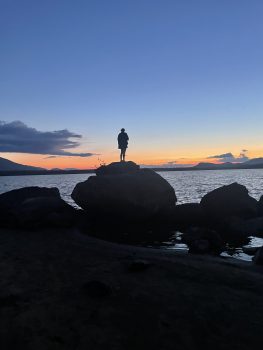
Fusion Week: Maine Huts & Trails, Saddleback Mountain, Mt. Blue State Park
Using the UMF campus as a learning laboratory, students examine how sustainability principles are put into practice at an institution that values its commitment to the environment.
During Fusion Week, we conduct field visits in Franklin County to meet with outdoor recreation and organic farming professionals to learn about their sustainability practices. We then focus attention on campus sustainability initiatives such as the UMF Biomass Heating Plant, the LEED-certified Education Center, Community Garden, and Farmington Compost Cooperative. Visits to these facilities and discussions with our staff encourage students to engage peers and professionals to discover pathways to involvement with environmental stewardship opportunities while at UMF and beyond. A class project guides students through a collaborative research design process to develop and submit a proposal to help UMF build on its record of environmental achievement and enhance its performance as a sustainable campus.
- Explore projects on campus designed to make UMF more sustainable including the UMF Biomass Heating Plant, the LEED-certified Kalikow Education Center, the UMF Community Garden, and the Thrifty Beaver Student Coop
- Visit community projects in the Farmington area designed to promote sustainable practices such as the Tom Eastler Memorial Compost Site and the Farmington Solar farm
- Meet other upperclass students interested making UMF a Sustainable Campus through the Sustainable Campus Coalition

FYS 100: Section 15 & HON 101 Section 5: Urban Maine
Credits: 4
Lewis Robinson & Steven Pane
Fusion Week: Exploring Portland
Urban Maine: The Stories and Sounds. Maine’s largest city, Portland, continues to evolve and add new layers to its unique history.
During our Fusion week, we spent three days and two nights exploring the city, culminating with extended interviews of a variety of Portlanders: writers, entrepreneurs, teachers, chefs, and tattoo artists. Our students worked in pairs to document these individual narratives, and then spent the first third of the course learning how to edit their footage into a video essay. In Farmington, students applied their skills as they sought new stories and sounds. They collected and manipulated soundscapes, interviewed locals and crafted new video essays, and experimented with different ways of collaborating and telling impactful stories.
- Explore the Coastal Maine cities of Portland and Belfast
- Investigate how the dynamics of sounds shape place and experience
- Learn how to record and produce audio
- Craft powerful stories from the soundscapes you collect
- Collaborate with your classmates as you explore Maine and join the UMF community
Yolanda Ares (’26): “I lived in a city, so for me that wasn’t much of a big difference. But the people we met and interviewed to capture their stories, that is what I truly took away from the experience… When you learn something new, as that stranger becomes a friend in that moment, them telling you their story really impacts you.”
FYS 100 Section 19: Adventure Therapy
Credits: 4
Kayla Lee & Aly LeBlanc, Adaptive Outdoor Education Center
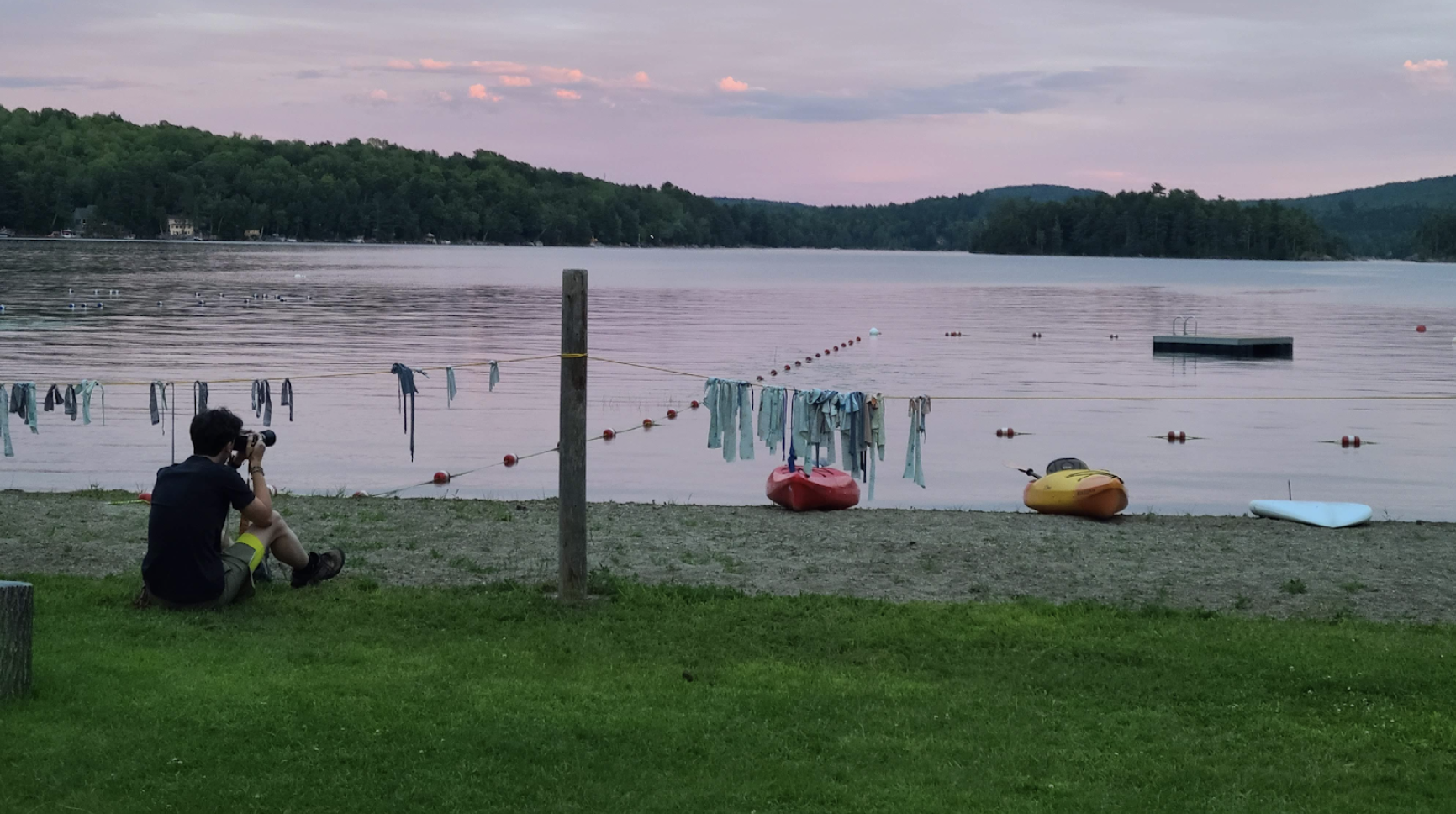
Adventure Therapy leverages challenging activities, often in nature-based environments, to support the therapeutic healing process. In this FYF section, we will discuss and explore application of the principles and benefits of adventure therapy.
During Fusion Week, you will experience different types of recreational activities available throughout Maine. This course will help you gain a solid foundation in the purpose and evidence-based practices of adventure therapy although it is not meant to provide students with adventure therapy, mental health treatment, or personal therapeutic services. The final project will allow students to design an adventure therapy session based on knowledge gained in the class guided by their own personal interests.
Riley Greene (‘26): “I learned the importance of being mindful, specifically being mindful of my surroundings as well as myself. Through Adventure Therapy I became more aware of people’s disabilities and situations that impede their everyday life, where it pushes me to look for more accessibility within our society.”
First Year RLES: First Year Seminars
HON 101 Section 1: Bigfoot
Credits: 4
Luke Kellett
Experiential Outing: Camping, ‘Squatching, and visiting the Cryptozoology Museum
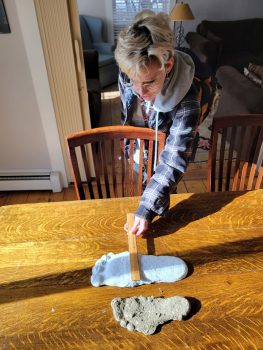
This course explores the role that Bigfoot plays in American culture while also examining its historical, cross-cultural roots. Much of the course considers how the Bigfoot phenomenon offers a window into the complex relationships between belief, evolution, science, myth and culture. Students will consider the existing evidence for Bigfoot and come to understand those who “hunt”, study, ridicule and celebrate this legendary creature. At a broader context, the course questions why belief in Bigfoot continues and how it may reflect our own separation from nature and our ancient, wild past. We will search for Bigfoot during a weekend camping trip to a place with historical Bigfoot sightings, visit the Cryptozoology Museum in Portland, make Bigfoot tracks in wet and dry substrate, and construct a Bigfoot silhouette to attract interest in our research survey into Bigfoot beliefs in the UMF community.
- Engage with concepts of scientific legitimacy, authority, and mythology
- Make Bigfoot tracks and a gigantic Bigfoot silhouette to support our qualitative research into Bigfoot beliefs
- Design and implement a research project, conduct interviews and surveys, and report the results
FYS 100 Section 6: Your Success at UMF and Beyond
Credits: 4
Christine Wilson
Experiential Outing: Writers’ Retreat
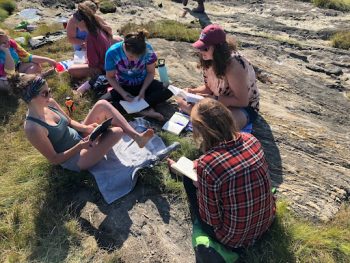
You are at UMF because we appreciate your achievements in life so far, we see your potential as a UMF Beaver, and we know you will be able to make a positive difference after graduation. Everyone’s journey through UMF will be different because each of you is unique. Whether you’re coming to UMF right out of high school or after being away for a while, whether high school was easy or hard for you, whether you want to participate in activities at UMF that already interest you or explore new opportunities, whether you are outgoing or shy, a commuter or an on campus student, if you have to hold a job–you can succeed at UMF.
In this class we will explore what it takes for students, as individuals, to succeed. In addition, we’ll learn about the many resources available at UMF to make sure you have fun and are supported through both good and challenging times. While you are all different, you all want to succeed, and UMF is invested in your success.
- Think about how collective wisdom aids in college success
- Interview family, friends, and UMF staff and faculty about their college journey and professional trajectories
- Identify factors and patterns that create success in college and beyond
Advanced RLEs
Credits: 4
Lori Koban
MAT 220 Section 1: Data Analysis
Pathways to Careers: Actuaries, Data Analysis, Math Education
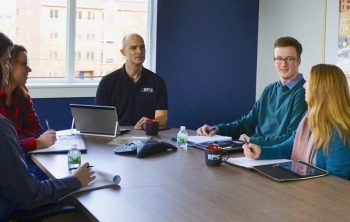
This course covers data analysis and inferential and descriptive statistics with a focus on written and oral communication of statistical ideas, and is intended for pre-service teachers and math/computer science majors. The course centers on a data analysis project, in this case with Partnership for Health, an Augusta-based consulting firm working on public health initiatives. We analyzed several years of survey data on pregnancy outcomes among women who had experienced circumcision or female genital mutilation and reported our findings back to Partnership for Health. As an Advanced RLE, we included Pathways to Careers focusing on what data analysts do in the professional world, including a field trip to MEMIC in Portland and interviews with recent UMF alumni working with data in their career.
- Explore careers in actuarial science and data analysis through conversations and interviews with recent UMF alumni
- Provide service-learning to a real-world consultancy via high-quality data analysis and reporting
- Gain professional skills while building your professional network


